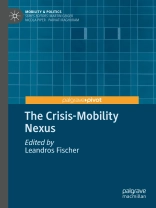Situated at the intersections of anthropology, migration, citizenship, and social movement studies, this volume theorises a crisis-mobility nexus by focusing on empirical case studies. These concern migration struggles; the entanglements of crisis, social mobility, and citizenship; as well as the impact of COVID-19 (im)mobility on social movements. By highlighting examples from these streams, the book illuminates entanglements between them, while emphasising the role of solidarity as well as de-solidarisation in creating, shaping, or resisting various regimes of mobility.
Tabela de Conteúdo
Chapter 1 – Regimes of mobility in times of accelerated crisis, Leandros Fischer.- Chapter 2 – Deportable mobilities: The many lives of the European deportation regime, Martin Bak Jørgensen.- Chapter 3 – Rethinking mobility regimes at the local scale: Possibilities and limitations, Martin Bak Jørgensen & Leandros Fischer.- Chapter 4 – Dubai and Cyprus as geographies of social mobility between Europe and the Middle East, Jaafar Alloul & Leandros Fischer.- Chapter 5 – Between solidarity and de-solidarisation: COVID-19 as a crisis of mobility, Leandros Fischer.- Chapter 6 – Essential workers without essential rights: COVID-19, migrant workers, and trade unions, Mark Bergfeld & Martin Bak Jørgensen.- Chapter 7 – New crises, new mobilities, and the promise of solidarity, Leandros Fischer.
Sobre o autor
Leandros Fischer is Assistant Professor for International Studies at the Department of Culture and Learning at Aalborg University, Denmark. He researches migration, citizenship, and social and political movements.












